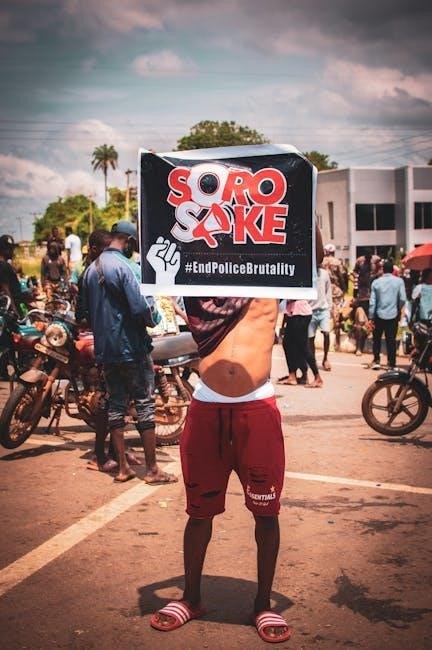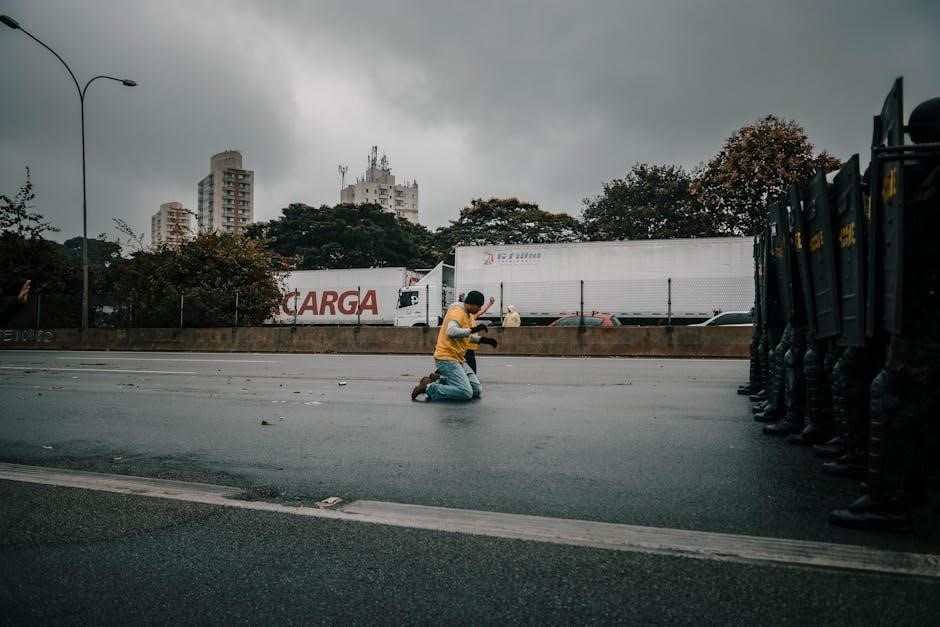Understanding your rights when interacting with police is crucial for protecting yourself and ensuring fair treatment. Knowing these rights empowers citizens to navigate encounters confidently, promoting accountability and transparency in law enforcement actions.
The Importance of Knowing Your Rights
Knowing your rights when interacting with police is essential for protecting yourself and ensuring fair treatment. Understanding these rights empowers citizens to navigate encounters with confidence, fostering accountability and transparency in law enforcement actions. Many individuals are unaware of the legal protections available to them, which can lead to unnecessary complications or violations of their freedoms. By familiarizing yourself with your rights, such as the right to remain silent, refuse unwarranted searches, and request officer identification, you can better safeguard your interests and avoid misunderstandings. This knowledge also promotes mutual respect between law enforcement and the community, ensuring that interactions remain lawful and respectful. Informed citizens are better equipped to advocate for themselves and others, contributing to a more just and equitable society. Awareness of these rights is not just a legal safeguard but a fundamental tool for upholding personal dignity and autonomy in encounters with authority figures.

Key Rights Citizens Have When Interacting with Police
- The right to remain silent and avoid self-incrimination.
- The right to refuse searches without a warrant.
- The right to know the identity of police officers.
The Right to Remain Silent
The right to remain silent is a fundamental right protected under the law, allowing individuals to refrain from answering questions that could incriminate them. This right is part of the Miranda rights, which police must recite upon arrest. Citizens are not obligated to speak to officers, even if asked. Anything said can be used as evidence in court, so invoking this right is crucial. If you don’t have a lawyer, you can still request to speak to one before answering questions. Remaining silent helps protect against self-incrimination and ensures legal safeguards are in place. It’s important to politely decline to answer until legal representation is present, as this can prevent unintended legal consequences.

The Right to Refuse a Search Without a Warrant

Citizens have the legal right to refuse a search of their person, belongings, or property without a valid search warrant. The Fourth Amendment protects against unreasonable searches and seizures, requiring police to obtain a warrant based on probable cause. If officers ask to search your car or home, you can politely decline. Refusing a search does not imply guilt; it’s an assertion of constitutional rights. However, police may still conduct a search if they have probable cause or exigent circumstances. It’s essential to remain calm and assertive, clearly stating your refusal. Documenting the interaction can also help protect your rights. Knowing this right empowers individuals to stand up against unwarranted intrusions, ensuring law enforcement operates within legal boundaries. Refusing a search without a warrant is a critical aspect of safeguarding personal privacy and upholding constitutional protections.
The Right to Know the Identity of Police Officers
Citizens have the right to know the identity of police officers during interactions. This includes requesting the officer’s name, badge number, and the station they are assigned to. Providing this information is a standard procedure in many jurisdictions, as it ensures transparency and accountability. Knowing the officer’s identity allows individuals to file complaints or seek further assistance if necessary. This right is essential for maintaining trust between law enforcement and the community. Officers are typically required to provide their identification upon request, and refusing to do so may be a violation of protocol. Exercising this right empowers citizens to hold officers accountable for their actions and ensures that interactions are conducted fairly and professionally. It also helps prevent misunderstandings and promotes a more open relationship between police and the public they serve. Knowing this right can make interactions with law enforcement clearer and more transparent for everyone involved.

What Police Can and Cannot Do
Citizens have the right to request and know the identity of police officers, including their name, badge number, and station. This transparency ensures accountability and builds trust between law enforcement and the public.
Understanding Police Powers and Limitations
Police officers have specific powers granted by law, but these are balanced by clear limitations to protect citizens’ rights. Officers can make arrests, conduct searches, and use force under certain conditions, but these actions must comply with legal standards. For instance, police can enter a home without a warrant in emergencies or when in hot pursuit of a suspect. However, they generally need a warrant to search private property unless exigent circumstances exist. Citizens should understand that police powers are not absolute; officers must respect constitutional rights, such as the Fourth Amendment’s protection against unreasonable searches and seizures. Knowing these boundaries helps individuals navigate interactions with law enforcement confidently and ensures accountability. Stay informed about your rights and the legal framework governing police actions to promote fairness and safety in such encounters.
When Police Can Enter Your Home Without a Warrant
While police typically need a warrant to enter a home, there are exceptions where they can do so without one. Exigent circumstances, such as an emergency or hot pursuit of a suspect, allow officers to enter without a warrant. Additionally, if consent is freely given by a resident, police can enter legally. In cases where there is an immediate threat to public safety or evidence may be destroyed, warrantless entry is also permitted. Understanding these exceptions is crucial for citizens to know when police actions are lawful and when they may be overstepping their authority. Being informed empowers individuals to assert their rights while recognizing legitimate police procedures.
The Fourth Amendment and Search Warrants
The Fourth Amendment protects against unreasonable searches and seizures, requiring warrants to be judicially approved and based on probable cause, ensuring citizens’ privacy and rights are safeguarded during police investigations.
What Constitutes Probable Cause for a Search
Probable cause is a legal standard requiring police to have sufficient reason, based on facts, to believe a crime has been or is being committed. It must be more than a suspicion—it demands evidence or credible information linking the individual to illegal activity. For instance, if an officer witnesses a crime or has reliable tips from informants, this can establish probable cause. Without meeting this threshold, a search warrant cannot be issued, protecting citizens from unwarranted intrusions. Courts review the basis for probable cause to ensure it aligns with constitutional protections, maintaining the balance between law enforcement needs and individual rights. Understanding this principle helps citizens recognize when police actions may overstep legal boundaries, empowering them to assert their rights effectively.
Daytime Searches and Exceptions
Search warrants are typically required to be executed during daylight hours, defined as between 6 AM and 10 PM. This rule aims to protect privacy and reduce the potential for intimidation or abuse of power. However, exceptions exist, allowing police to conduct searches at night under specific circumstances. For example, if there is a risk of evidence being destroyed or if a suspect might flee, law enforcement may obtain a nighttime search warrant. Additionally, in emergency situations, such as hot pursuit of a suspect or an immediate threat to public safety, police may conduct a search without waiting for daylight. Understanding these exceptions is crucial for citizens to know when police actions are lawful and when they might be overstepping their authority. Awareness of these rules helps ensure that individual rights are respected while allowing police to perform their duties effectively.

Police Use of Force and Your Rights
Police use of force must be reasonable and proportionate to the threat posed. Citizens have the right to protection from excessive force, ensuring their safety and legal recourse if rights are violated.
When Police Can Use Force and How to Protect Yourself
Police can use force when there is an immediate threat to safety or to prevent a crime. However, this force must be reasonable and proportionate. To protect yourself, stay calm, avoid sudden movements, and comply with lawful orders. Understanding your rights, such as the right to remain silent and to refuse unlawful searches, is essential. If you believe force was used unlawfully, document the incident and seek legal advice. Knowing these boundaries helps ensure interactions with law enforcement remain safe and respectful for everyone involved.